When Mississippi faced tough economic and social problems after the Great Depression and World War II, Owen Cooper challenged Mississippians to band together and successfully solve them. Whether the need was for rural hospitals and affordable health insurance, production of a fertilizer that increased crop yield for a hungry world, better race relations, or spreading Southern Baptist missions around the globe, Cooper repeatedly led Mississippians to work together and make the seemingly impossible possible.
For four decades, from 1945 to 1980, Cooper showed that thousands of everyday citizens in Mississippi could come together and create world-class solutions to their own problems.
Lawrence Owen Cooper was born on the high ground in the Warren County hills, eight miles north of Vicksburg, on Easter Sunday 1908. His father, William Samuel Cooper, had come down the Mississippi River from Kentucky on a two-man skiff with Daniel Boone, the great-nephew of the legendary pioneer. Like most farm homes of the time, Cooper's home was without indoor plumbing or electricity. His first schooling was in a one-room elementary school run by his mother, Malena Head Cooper, who was the last of her French family to speak their native tongue. Cooper excelled at public speaking at Culkin Academy, one of the state's first consolidated public schools. “It was good training,” he said, “because I spent the rest of my life trying to persuade farmers and Baptists to take on important challenges.”
Cooper worked his way through Mississippi A & M College (now Mississippi State University) sweeping sidewalks and delivering the Memphis newspaper The Commercial Appeal. In 1940, he was managing the Mississippi Housing Authority, when Paul Johnson Sr. was elected governor and fired Cooper to make room for a political ally. “Being fired by Paul Johnson was the best thing that ever happened to me,” laughed Cooper. It led him to the Mississippi Farm Bureau and his life work of motivating and marshaling thousands of Mississippians to meet their most pressing social, economic, and spiritual needs.
Rural hospitals
As World War II drew to a close in 1945, Cooper was executive director of the Mississippi Farm Bureau Federation, which represented Mississippi's 250,000 farmers and rural families. Mississippi faced a critical need for better hospitals to serve its rural population. In 1946 Cooper, representing the Farm Bureau, convinced the Mississippi Legislature to establish the Mississippi Commission on Hospital Care and to match federal Hill-Burton (the Hospital Survey and Construction Act) funds to build rural hospitals. With Cooper as chairman, the commission built more than a hundred rural hospitals across the state.
But almost no one in Mississippi could afford health insurance to pay hospital and medical bills. Again, Cooper and the Farm Bureau had the solution: if Mississippians could band together they could get coverage at affordable prices. Soon the Farm Bureau and Cooper helped organize BlueCross BlueShield of Mississippi. Since its beginning Blue Cross has provided affordable health insurance to more Mississippians than any other firm.
For several decades farm families in the South had found it impossible to obtain reasonably priced life insurance or property insurance for their farms and homes. So, in 1945, Cooper led the Farm Bureau's initiative to encourage farm families from Mississippi, Alabama, Arkansas, Kentucky, and Texas to put up $400,000 and form Southern Farm Bureau Life and Casualty Insurance Company. Soon this new company, headquartered in Jackson, was providing affordable insurance coverage to farm families in those five states. In 2005, the Southern Farm Bureau Life Insurance Company and the Southern Farm Bureau Casualty Company are two of the largest insurance enterprises in the southeast, and each has headquarter buildings in Jackson.
Then destiny handed Owen Cooper an even tougher challenge: to help build the world's first farmer-owned nitrogen fertilizer factory.
Maker of fertilizer
In 1943, two researchers at Mississippi Agricultural Experiment Station – Dr. W. Baker Andrews, an agronomist, and F. E. Edwards, an agricultural engineer – had begun work to determine the value of ammonia as a source of nitrogen for crop plants. Their work included the design of application equipment. Thus, in March 1947, Andrews had astonished the world by proving that the use of anhydrous ammonia as fertilizer could boost yields of grains and cotton from two to tenfold. This was a major contribution to world agriculture in that it gave the farmer a cheap source for nitrogen. Overnight farmers across the South and the world were clamoring for supplies of this product.
Because of the explosion in demand, ammonia was virtually impossible to purchase and prices were extremely high. Once again, Owen Cooper and the Mississippi Farm Bureau invited farmers to solve their own problem. Cooper's job was to challenge farmers across the state and South to buy stock in a brand new farmer-owned company that would build the world's first farmer-owned nitrogen fertilizer plant – Mississippi Chemical.
But producing ammonia (the chemical compound NH3) required an expensive petrochemical plant that would cost millions of dollars to build and highly trained technicians and engineers to operate. Nowhere in America had farmers constructed such a complicated, costly plant to take nitrogen from the air and make fertilizer. Cooper proposed doing so in Mississippi. Skeptics laughed at the idea.
But the Mississippi Farm Bureau, Cooper, and a distinguished team of Mississippi farm leaders were determined to do what had never been done before. John Sharpe Williams Jr. of Yazoo County, son of former U.S. Senator John Sharp Williams; Charles Whittington of Greenwood, son of U.S. Congressman Will Whittington; and LeRoy Percy of Greenville, adopted son of author William Alexander Percy, all joined Cooper in leading the campaign. These men and other visionary leaders convinced the Mississippi Legislature, the Mississippi Bankers Association, and the voters of Yazoo County to back the project. With a team of determined salesmen, Cooper crisscrossed the South asking thousands of farmers and their bankers to invest a total of $4.25 million in the new venture. In 1980 Cooper noted that, “Raising four million dollars in those days was about like raising four hundred million dollars in 1980.” (Or $4 billion in 2005.)
When no American banks were willing to lend the farmers the final $3.4 million needed to construct their plant, Cooper went to Washington in January 1950 to plead the case for a farmer-owned fertilizer plant before federal authorities. Although government experts doubted the project would ever succeed, Cooper and Southern congressmen carried the day and secured a loan from the government.
Months later, on March 16, 1951, the first bags of nitrogen fertilizer were produced at Mississippi Chemical Corporation in Yazoo City, Mississippi. Over the next fifty years, Mississippi Chemical Corporation would grow to be one of the world's most successful makers of fertilizer, building plants in Pascagoula, Mississippi, Donaldsonville, Louisiana, Carlsbad, New Mexico, and the island nation of Trinidad, off the coast of South America.
With Mississippi Chemical Corporation enjoying great success, from 1957 to 1960 Cooper invited its shareholders to return penny postcards directing their dividends to the purchase of stock in another new venture, First Mississippi Corporation, and to become a part of the first venture capital effort in the state. Seven thousand postcards arrived from southerners who had come to trust Cooper and had purchased $5 million in stock. After a shaky infancy, First Mississippi became a success story and in 1975, it became the first Mississippi corporation ever listed on the New York Stock Exchange. In 2002, the international chemical giant DuPont shelled out $400 million to purchase the company, then known as ChemFirst Corporation.
When farmers from India visited Mississippi and asked Cooper to help them build their own fertilizer plants to feed their massive population, Cooper could not say no. In the late 1960s, he spent months persuading American fertilizer firms and the U.S. Agency for International Development to join him in helping the Indians build the first farmer-owned venture on that continent. With Cooper's coaching, India established Indian Farmers Fertilizer Cooperative (IFFCO) and eventually built a $150 million fertilizer complex at Kandla, India. Over the next two decades, IFFCO would build major fertilizer complexes across India and help the nation raise the grains needed to feed the world's second most populous nation.
Baptist missions
As hard as Owen Cooper worked to provide fertilizer and food for a hungry world, he said his greatest love was helping people meet their spiritual hunger, in America and the world. From the time he entered Mississippi A & M College in 1925 to his death sixty-one years later, Cooper was a powerful and popular lay-preacher and organizer of Southern Baptist missions across five continents. He was especially devoted to nurturing the Baptist movement in Brazil and India where he helped launch thousands of Baptist congregations. Cooper was the second and last layman ever elected president of the Southern Baptist Convention. During his two-year tenure from 1972 to 1974, he visited every state in the United States and every country where Baptists had missions. In 1985, a year before his death, the Mississippi Baptist Convention named Owen Cooper “The Southern Baptist Layman of the Century.”
Better race relations
During the tumultuous Civil Rights Movement in Mississippi in the 1960s, Cooper's deep moral convictions led him to stand up and speak out for tolerance and cooperation between Black and White people. When James Meredith's integration of the University of Mississippi on September 30, 1962, was met by mob violence that left 375 injured and two dead, Cooper was one of Mississippi's White civic leaders who issued a public statement abhorring the violence and pleading with Mississippians to respect and obey the laws of the land.
After thirty-five Black churches were burned across Mississippi in 1964, Cooper helped organize the Mississippi Religious Leadership Council that spoke out boldly against the bombing and burning of churches and synagogues. “The burning of those black churches left him livid,” his longtime personal assistant Sue Tatum recalled. “It was one of the few times I ever saw him enraged.”
Cooper was also one of the few White Mississippi leaders to advocate the peaceful desegregation of Mississippi workplaces, public facilities, colleges, and public schools. In 1966, Cooper took the unprecedented step of partnering with NAACP State Chairman Aaron Henry to pull together Black and White leaders to form Mississippi Action for Progress and run the largest Head Start program in the South to service disadvantaged Mississippi preschoolers. He made the decision to become involved in the biracial program knowing it would jeopardize his long-held, but private, goal to someday run for governor of Mississippi.
The next year, Cooper recruited the company's first African American professional, Louise Dean, to work on his personal staff at Mississippi Chemical Corporation in Yazoo City. And when the United States Court of Appeals for the Fifth Circuit ordered the integration of thirty public schools across Mississippi in October 1969, Cooper's strong leadership was again evident in his hometown of Yazoo City. On January 7, 1970, 1,362 White students and 2,077 Black students peacefully entered the integrated schools as Yazoo City demonstrated more support of its public schools than any other school district in Mississippi. When the national news media asked why Yazoo parents supported their public schools at the same time that neighboring towns were abandoning their schools, the influence of Owen Cooper and Mississippi Chemical Corporation were cited as key reasons calm judgment prevailed.
One of the hallmarks to Owen Cooper's leadership was the impeccable standards for integrity, honesty, and fair play that he lived out and inspired Mississippi Chemical Corporation to adopt as its corporate credo. In a 1982 interview Cooper spoke about organizational values. “A company has character just as much as an individual person does. And I think the character of our organization is one of its most important aspects. Character isn't something you DO. It's something you ARE.”
Cooper retired as president of Mississippi Chemical Corporation in 1973 and continued to sit on its board, as well as on the board of directors of First Mississippi Corporation, until his death November 8, 1986, at age 78.
At the turn of the 21st century, a quantum change in the U. S. price for natural gas, the principal ingredient in nitrogen fertilizers, decimated the American fertilizer industry. In May 2003, Mississippi Chemical filed for bankruptcy protection. In December 2004, Terra Industries purchased Mississippi Chemical for $265 million and the company came out of bankruptcy.
Extras
Hear Owen Copper talk about his early career. Audio clip from 1975 interview courtesy The Center for Oral History and Cultural Heritage at the University of Southern Mississippi
Read excerpt from Cooper's oral history (PDF)
Jo G. Prichard III served as Owen Cooper's executive assistant at Mississippi Chemical Corporation from 1965 to 1970 and in 1998 wrote Making Things Grow: The Story of Mississippi Chemical Corporation. This history served as the primary reference for this article.
-
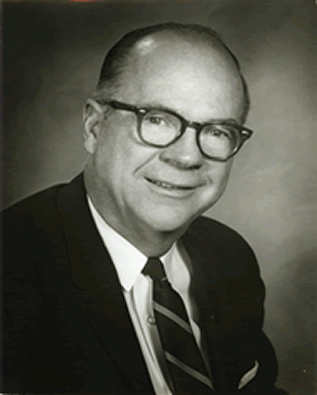
Owen Cooper led Mississippi Chemical Corporation through its first 25 years, 1948-1973. Courtesy Mississippi Department of Archives and History, Owen Cooper Collection. -

Mississippi Chemical Corporation was chartered September 7, 1948. Its initial officers: seated, John Sharp Williams Jr., president; Mamie F. Marshall, acting secretary-treasurer. Standing, from left: Owen Cooper, executive vice president and chief operating officer; Charlie L. McNeil, second vice president; and Charles Whittington, first vice president. Courtesy Mississippi Department of Archives and History, Owen Cooper Collection.
-
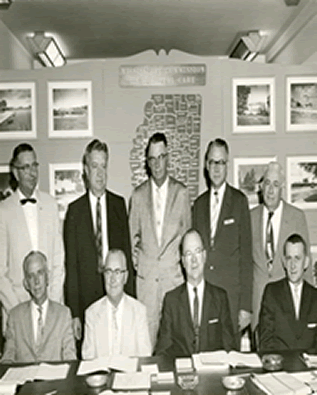
Summer 1958 meeting of the Mississippi Commission on Hospital Care. Front row, left to right: Dr. A. L. Gray, Carl W. Blomquist, Owen Cooper, W. S. Moore. Back row, left to right: Lester Tuck, Foster Fowler, Joe W. Carr, Harvey Hedgepeth, Dr. W. H. Anderson. Courtesy Mississippi Department of Archives and History, Owen Cooper Collection. -
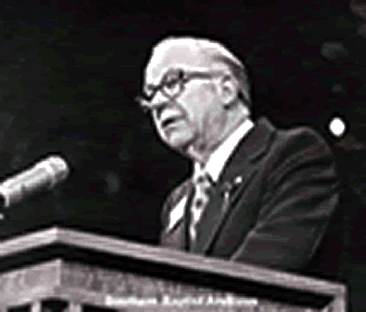
Cooper served as president of the Southern Baptist Convention from 1972 to 1974. Courtesy of Southern Baptist Convention in Nashville. -
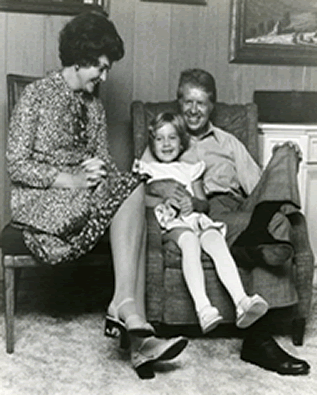
July 1977: Cooper's close friend President Jimmy Carter is houseguest. President Carter is shown here with Owen Cooper's daughter, Elizabeth, and granddaughter, Lizbeth.Courtesy Mississippi Department of Archives and History, Owen Cooper Collection. -
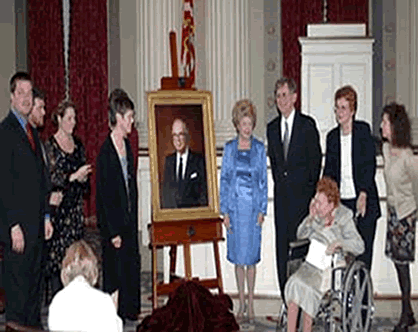
Family and friends gather for dedication of Owen Cooper portrait to the Hall of Fame of the State of Mississippi at the Old Capitol Museum on November 23, 2003. Cooper was elected to Mississippi Hall of Fame in 2001. Courtesy Mississippi Department of Archives and History.
References
Published Sources
McGregor, Don. The Thought Occurred to Me: A Book About Owen Cooper. Nashville: Field Communications & Publishing, 1992.
Prichard, Jo G. III. Making Things Grow: The Story of Mississippi Chemical Corporation. Jackson: University Press of Mississippi, 1998.
Pittman, Bob. First Mississippi Corporation: A Twenty-five Year History. Jackson: Franklin Printers, Inc., 1982.
Jackson Clarion Ledger (Miss.). Special edition commemorating Owen Cooper's retirement and Mississippi Chemical Corporation's first quarter century. 3 June 1973.
Archived Sources
Mississippi Department of Archives and History, Mississippi Chemical Corporation Collection, Jackson, Mississippi.
DeCell, Harriet. Unpublished transcriptions of interviews conduced with Owen Copper in 1980.
Gilbert, A.S., III. Mississippi Chemical Corporation Documentary. 1965. An unpublished eight-volume collection of newspaper clippings, correspondence, brochures, and other materials describing the early history of Mississippi Chemical Corporation.
